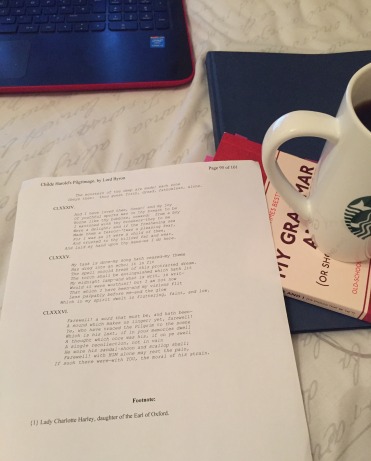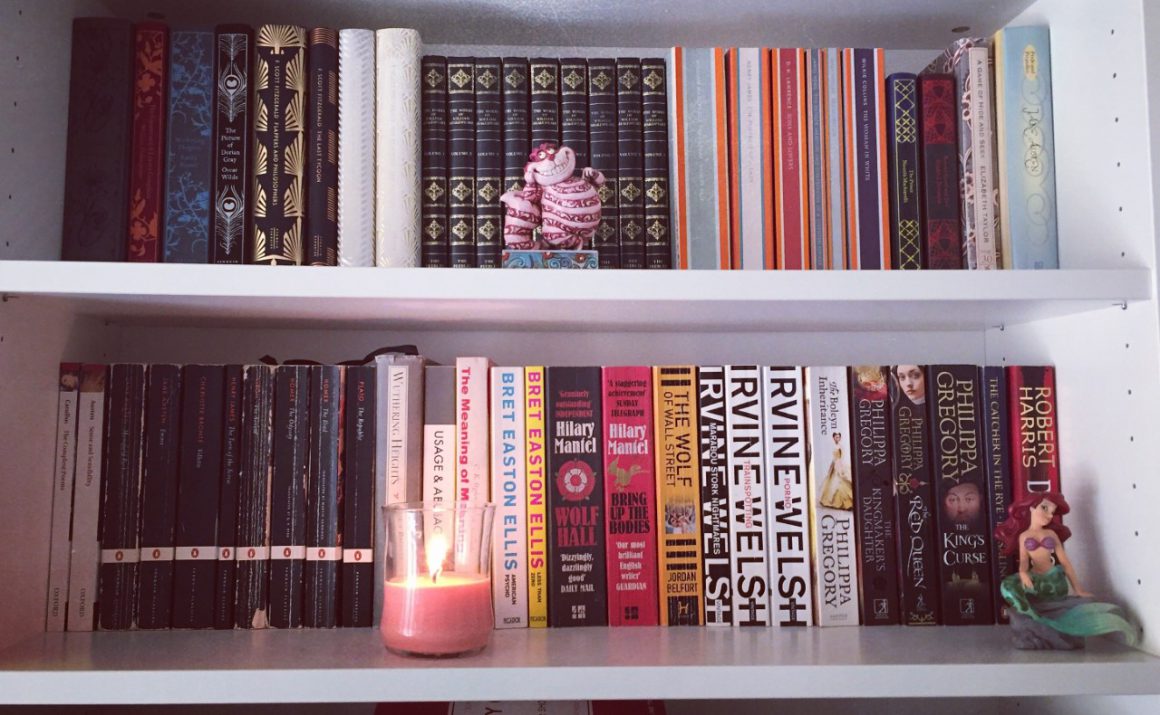So today I finally finished reading Childe Harold’s Pilgrimage by Lord Byron, needless to say I’m feeling pretty pleased with myself because it is long. This is the only Byron that I’ve ever read, and it’s in preparation for a course unit that I will be doing on him this year at University. I do feel somewhat guilty that it has taken me so long to get around to reading him, he’s been on my to read list for a long time now. I thought some of it was really beautiful, particularly the opening sections; although it was only my first reading so a fair amount of it went way over my head. I’ve studied classics, so the descriptions of Greece and Italy and the mentions of the pagan Gods were also aspects I found interesting.
I’ve always adored poetry, but predominantly the more modern authors; Plath, Lowell and Eliot have always been my firm favourites. However, I do always try to keep an open mind and give all poets a chance. I’m not a major fan of the Romantic movement, but I’ve only really encountered Blake and Wordsworth, and the movement is so much bigger than those two figures. So that’s a large part of the reason that I opted to study Byron, I wanted to give the movement a bit more of a chance.
Although University has taught me that most of the people on my English Lit course don’t share my enthusiasm for poetry. I can’t pretend it didn’t confuse me- a lot. I know it isn’t everyone’s cup of tea and many people prefer books (totally understandable), but I am talking about a borderline vehement dislike from nearly everyone who I’ve spoken to about it. I can see why some people don’t adore it; I’ve heard a lot of people talking about how it’s too veiled etc, but I favour the Confessional movement so that’s not totally applicable to my personal taste.
There’s a total of fourteen people taking the Byron course unit, out of nearly 150 English students, and a few have already mentioned to me that it’s only because there’s less reading involved in what is going to be a content heavy year. I really did think that such seminal figure in poetry would have attracted a lot more enthusiasm, and that the sole appeal wouldn’t be the thought of an easier workload. I took a look at the other course units that were on offer, and Byron was the only unit that solely focused on poetry. Which got me thinking, I actually have not had the option throughout my degree to do a unit which is entirely focused on poetry. If course units are renewed based on popularity, then Lord Byron certainly won’t be making a triumphant return for next year’s English students.
I wonder if this is part of a wider trend across universities, is poetry just being viewed as slightly out of fashion now? I do hope not, because I think there is poetry out there to suit everyone, just like books, you just have to be open minded when trying to find it. 
If anyone reading this has any experience with reading Byron, or the wider Romantic movement in general, I’d love to hear your views as I am relatively new to it from an academic perspective 🙂

You’re seeing two things at work: lazy readers (let’s be honest about this) and intentionally cryptic writers. Philosophy suffers from the same issues in many ways. It’s as if writers think their ideas will lose force if people actually, you know, understand them. What I think it really amounts to is an insecurity on the writer’s part that his/her ideas are not as profound as they appear when written cryptically. The other half of the equation, the lazy reader, is up to poets to remedy. Poets should strive to use the art form for what it is: the most efficient way of conveying meaning while using the clumsy medium of words. If they do this properly, readers will be forced to consider the weight of the ideas.
Then again…everyone might just be tied up with Harry Potter right now, so who knows?
LikeLike
Lazy readers unfortunately make up a fair percentage of people who study literature (in my personal experience). I don’t mind having to delve for meaning; a bit of ambiguity can lead to multiple interpretations which I think is always interesting.
You’re so right about philosophy; I’ve done a bit on it over the last few years and I found it challenging, like they were all hellbent on causing en masse confusion. Haha yes, that does seem to be occupying A LOT of people at the moment.
LikeLike
In my experience, the more difficult it is to understand, the less it is saying….
I will admit to somewhat cryptic writing, but I take the time to explain my poetry to whomever I’m reading it to so they understand word placement and choice. Harder to do that via the blog right now, but I plan on launching something that is rife with annotation so people can share in the beauty of well considered thought instead of puzzling over it.
LikeLike
Something of a paradox, but I see your point. Annotation is always great, it’s always really interesting to see how your interpretation differs and/or matches up to the thoughts of the author. I’ll have to check out your blog, I’m always interested in reading poetry!
LikeLike
Please do, I’d be happy to have you 🙂 Good luck with your Byron studies…he’s on of my favorites.
LikeLiked by 1 person